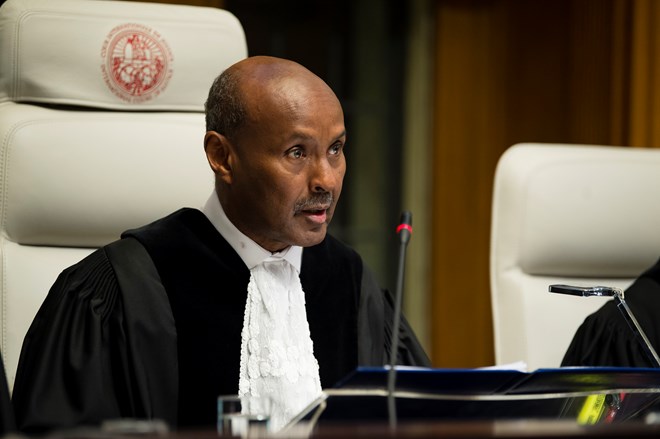The International Court of Justice (ICJ) on Friday handed down a judgment in which it decided it has jurisdiction to hear the Guyana/Venezuela border controversy case.
The judgment was read by the President of the ICJ, Judge Abdulqawi Ahmed Yusuf at the Peace Palace in The Hague where a public sitting of the court was held.
The case, instituted on March 29, 2018, by Guyana against Venezuela, had asked the ICJ to pronounce on the legal validity and binding effect of the 1899 Arbitral Award which determined the boundaries between the two countries.
Judge Yusuf said the court concluded that it has jurisdiction to hear Guyana’s claims concerning the validity of the 1899 Award and related questions of the definitive settlement of the land boundary dispute.
He, however, noted that the court’s jurisdiction is limited as it cannot entertain Guyana’s complaints on events that occurred after the signature of the Geneva Agreement.
“With respect to the court’s jurisdiction, the court notes that the scope of the dispute that the parties agree to settle through the mechanism set out in article 1 – 4 of the Geneva Agreement is circumscribed by Article One, thereof, which refers and I quote ‘to the controversy which has arisen as a result of the Venezuelan contention that the award of 1899 is null and void’.
“The court’s jurisdiction is, therefore, limited to the claims of either party that exited on the date the Agreement was signed…consequently, Guyana’s claims arising from events after the signature of the Agreement do not fall within the scope of the jurisdiction of the court,” the ICJ President said.
The court decided that the referral of the matter to the ICJ by United Nations Secretary-General António Guterres on January 30, 2018, was legal as is contemplated in the agreement.
Judge Yusuf expressed regret at the decision taken by Venezuela not to participate in the hearings so far. He said the non-appearance of any party has a negative impact on the administration of justice, but noted that even in Venezuela’s absence, the judgment is final and binding on both parties.
The Court’s President said now that the ICJ has claimed jurisdiction, Venezuela will be able, if it so wishes, to appear before the court to present its arguments.
According to the judgment, the 1899 Award states that both Guyana and Venezuela consented to the means of a judicial settlement. The full text of the judgment will be available on the ICJ’s website shortly.
Venezuela is maintaining a claim to 70% of Guyana’s territory, arguing that the 1899 agreement, which determined the boundaries between the two countries, is null and void.
The first hearing was held on June 30, 2020, where a high-level legal team representing Guyana put forward arguments on why the ICJ has the powers to hear and determine the case and ultimately put an end to the border controversy.
After the last push to see if talks could bear fruit between the two countries failed, the UN Secretary-General on January 30, 2018, announced that he was referring the matter to the International Court for a final and full settlement.
But Venezuela contends that the Secretary-General was not correct in taking the decision, saying that it wanted talks to continue. The Spanish-speaking country has argued that the court has no jurisdiction and so they did not participate in the oral hearings.
But Sir Shridath Ramphal – Guyana’s first Attorney General – who led Guyana’s arguments, said the court was now left to speculate as to what Venezuela might have said had it appeared before the court.
On November 28, 2019, Venezuela submitted a 56-page memorandum to the court, accompanied by a 155-page annex setting out the basis for its objections to the court’s jurisdiction.














Good…..well done team. Now the Court case will take a year or so. In the meantime……I would like to ask Mr Carl Greenidge to take over the leadership of the PNC and start working on a better relationship with the PPP in Parliament. The PNC could do no better than the good Gentleman and he would soon make everyone comfortable.